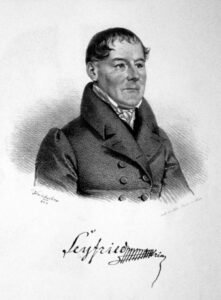Rest, most beautiful happiness on earth
(Poet's title: Ruhe, schönstes Glück der Erde)
Set by Schubert:
D 657
for TTBB quartet[April 1819]
Ruhe, schönstes Glück der Erde,
Senke segnend dich herab,
Dass es stille in uns werde,
Wie in Blumen ruht ein Grab.
Lass des Herzens Stürme schweigen,
Eitle Träume wiege ein;
Wie sie wachsen, wie sie steigen,
Wächst und steigt der Seele Pein.
Deinen Frieden gieb der Erde,
Deinen Balsam geuß herab,
Dass geheilt die Seele werde,
Sich erhebend aus dem Grab.
Rest, most beautiful happiness on earth,
Sink down and bring your blessings,
So that there can be quietness within us,
Like a grave resting underneath flowers.
Let the storms of the heart be silent,
Let vain dreams be rocked away;
As they increase and ascend,
So does the pain of the soul increase and ascend.
Give your peace to the earth,
Pour your ointment out,
So that the soul can be healed,
As it rises out of the grave!
All translations into English that appear on this website, unless otherwise stated, are by Malcolm Wren. You are free to use them on condition that you acknowledge Malcolm Wren as the translator and schubertsong.uk as the source. Unless otherwise stated, the comments and essays that appear after the texts and translations are by Malcolm Wren and are © Copyright.
☙
Themes and images in this text:
Dreams Flowers Graves and burials Hearts Noise and silence Pouring, scattering and strewing Rest Soul Soothing and healing Storms
It is unusual for poems of this type to be critical of dreams. In most German Romantic poetry they offer solace and an escape from the confusion of the waking world. In some sense they lead us into a more intense, more authentic reality than we can know as we go about our daily activity. For von Seyfried, though, it is the dreamworld that is the world of delusion and confusion. Dreams disturb us with false hope and they agitate the soul. True rest can only come if the storms within our hearts are calmed and if the dreams that tempt us are themselves put to rest.
☙
Note on the authorship of the text
In the Deutsch catalogue the author of this poem is said to be ‘unknown’ or ‘anonymous’. However, Peter Rastl argues that von Seyfried, the opera director at the Theater an der Wien, must have written the words. He published his own setting of the text for quartet and there is evidence that most of his other compositions were settings of his own poems.
Original Spelling Ruhe, schönstes Glück der Erde Ruhe, schönstes Glück der Erde, Senke segnend dich herab, Daß es stille in uns werde, Wie in Blumen ruht ein Grab. Laß des Herzens Stürme schweigen, Eitle Träume wiege ein; Wie sie wachsen, wie sie steigen, Wächst und steigt der Seele Pein. Deinen Frieden gieb der Erde, Deinen Balsam geuß herab, Daß geheilt die Seele werde, Sich erhebend aus dem Grab!
Schubert’s probable source was: Allgemeine musikalische Zeitung, mit besonderer Rücksicht auf den österreichischen Kaiserstaat. DritterJahrgang. Wien, 1819. Bey S. A. Steiner und Comp., Musikhändler. Gedruckt bey Anton Strauss. [Nro. 10.Den 3ten Februar 1819. Musikalische Beylage Nro. 1.]
https://anno.onb.ac.at/cgi-content/anno-plus?aid=amz&datum=1819&page=45
See also: Lieder-Buch für die Große Landes-Loge von Deutschland zu Berlin und ihrer Töchter-Logen. ZweiteAusgabe. Berlin, 1832. Gedruckt in der Dietericischen Buchdruckerei. (E. S. Mittler.)


